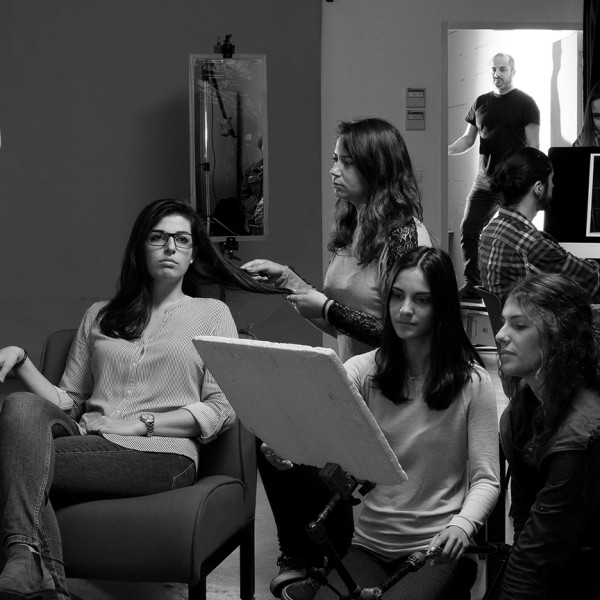Interview with Isabel Ruth for the Lessons in Film, Art and Multimedia project
06.07.22 - 10h00Interviewed by Edmundo Cordeiro
about Isabel Ruth
He came to Lisbon at the age of twelve where he began to study ballet. In 1958 he left for London, where he attended the Royal Ballet School for two years. Back in Portugal, he joined the Grupo Experimental de Ballet (which would later become Ballet Gulbenkian). There, she achieved several successes as a dancer, with emphasis on her creation in Ritmo Violento (1961), choreographed by Norman Dixon.
He joined the theater around 1970, after making his debut in the play "O Marinheiro", by Fernando Pessoa, directed by Fernando Amado at the Teatro da Casa da Comédia. He later worked with Ribeirinho (1967 - The General Inspector of Gogol at Teatro Villaret), José Wallenstein, Fernando Heitor, Diogo Dória, Jorge Listopad, among others.
Internationally, a short film with Pascal Aubie in France was the starting point for working with several European filmmakers. He settled in Italy in 1967 and there he frequented the artistic circles. She became friends with Pier Paolo Pasolini and Bertolucci, participating in several short films. It was directed by Pasolini in Edipo Re (1967), starred in two feature films (one, Il Retorno, directed by Leonello Massobrio, the other, H2S by Roberto Faenza). And also theater: alongside Laura Betti, he made Il Ricatto all Teatro by Dacia Maraini. After a long trip to the East, he lived in Spain and in 1973 he returned to Portugal. It was only in 1979 that she reappeared in the theater (in Éden Cinema by Marguerite Duras, directed by Fernando Heitor) and in the cinema she incarnated Queen Teresa in the film O Bobo by José Álvaro de Morais.
Considered one of the greatest actresses of Portuguese cinema, she is a fetish presence in the cinematography of Paulo Rocha, who directed her in Os Verdes Anos (1963), Mudar de Vida (1966), O Rio do Ouro (1998), A Raíz do Heart (2000) and Vanitas (2004). He worked regularly with Manoel de Oliveira on Vale Abraão (1993), A Caixa (1994), Viagem ao Terceiro do Mundo (1996), Inquietude (1998), Vou para Casa (2001), The Principle of Uncertainty (2002) and Espelho Mágico (2006). It was also directed by João Botelho (1980 - Conversa Acabada, 1988 - Tempos Difíceis), José Álvaro Morais, Jorge Silva Melo, Lauro António, Jorge Cramez, Eduardo and Ann Guedes, Manuel Mozos, Raoul Ruiz, Margarida Gil, Fernando Lopes, Teresa Villaverde, Pedro Costa, Raquel Freire, Cláudia Tomaz and Catarina Ruivo.
In 1995 at the Moscow Film Festival "Faces of Love" is elected the best actress for her performance in the film Pax by Eduardo Guedes (1994). He returned to filming in Italy with Tonino de Bernardi, where he participated in the 17th edition of the ¿Segni Barocchi¿ festival in Foligno. At the end of 1999, the Portuguese Cinematheque paid tribute to him and João Bénard da Costa dedicated the book The double life of Isabel Ruth to him. Isabel Ruth also writes and composes music. In 2007, she received the Golden Globe as Best Actress, for her performance in Vanitas by Paulo Rocha (2005).
Published Fotopoesia (2006) by Guerra&Paz, a poetic autobiography, with a preface by Urbano Tavares Rodrigues.
Selected Filmography
- The Green Years, by Paulo Rocha (1962)
- Sunday Afternoon, by António de Macedo (1965)
- Change of Life, by Paulo Rocha (1966)
- Oedipus Re, by Pier Paolo Pasolini (1967)
- Morire Gratis, by Sérgio Franchina (1967)
- Il Rapporto, by Leonello Massobrio (1968)
- H2S, by Roberto Faenza (1969)
- O Bobo, by José Álvaro de Morais (198?)
- Stories of Women, by Lauro António (198?)
- Finished Conversation, by João Botelho (1980)
- The Desire, by Paulo Rocha (1987)
- August, by Jorge Silva Melo (1988)
- Difficult Times, by João Botelho (1988)
- Na Pele do Urso, by Anne and Eduardo Guedes (1989)
- Elder Age, by Teresa Villaverde (1990)
- Xavier, by Manuel Mozos (1992)
- Dead Letters, by Robin Shepperd (1992)
- Terra Fria, by António Campos (1992)
- Vale Abraão, by Manoel de Oliveira (1993)
- Pax, by Eduardo Guedes (1994)
- The Box, by Manoel de Oliveira (1994)
- The Apartment, by João Tuna (1994)
- The Facade, by Júlio Alves (1995)
- The Apartment, by João Tuna (1996)
- Journey to the Beginning of the World, by Manoel de Oliveira (1997)
- Bones, by Pedro Costa (1997)
- The River of Gold, by Paulo Rocha (1998)
- Disquiet, by Manoel de Oliveira (1998)
- Os Mutantes, by Teresa Villaverde (1998)
- Comradeship, by Vasco Pimentel (1998)
- Three Bridges over the River, by Jean Claude Biette (1999)
- Appassionate, by Tonino de Bernardi (1999)
- The Root of the Heart, by Paulo Rocha (1999)
- Fish Moon, by José Álvaro de Morais (2000)
- Nights, by Claudia Tomás (1999)
- Lhomme de Foules, by John Lvoff (1999)
- Lourdes, by Lodovico Gasparini (1999)
- The Shadow, by Jesus Emanuel (2000)
- Rasganço, by Raquel Freire (2000)
- Hamlet, by Tonino de Bernardi (2000)
- I'm Going Home, by Manoel de Oliveira (2000)
- Film, by Fernando Lopes (2000)
- My Mistakes, by Jorge Cramez (2000)
- The Dauphin, by Fernando Lopes (2001)
- The Uncertainty Principle, by Manoel de Oliveira (2002)
- El Coche de Pedales, by Ramón Barea (2004)
- Adriana, by Margarida Gil (2005)
- Vanitas, by Paulo Rocha (2006)
- Magic Mirror, by Manoel de Oliveira (2006)
- From here to the front, by Catarina Ruivo (2008)
- Nadine, by Erik de Bruyn (2008)
- The Strange Case of Angelica" 2010
- Time Passes 2011
- Trip to Portugal 2011
- A Woman's Revenge 2012
- Versailles 2013











